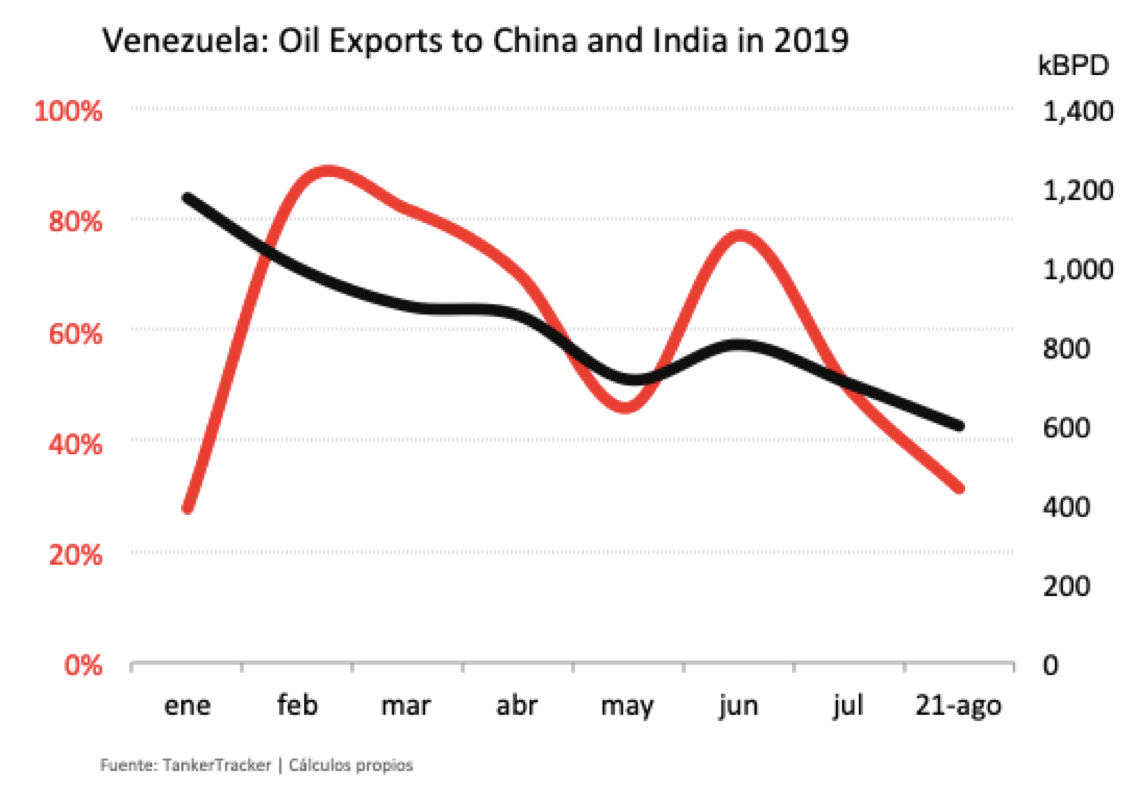





|
Tweet
|
|
|
Igor Sechin, CEO of the Russian oil company Rosneft, decided again to hold Nicolás Maduro in the presidency of Venezuela, allowing Rosneft to become the merchant company of Venezuela's oil, after President Donald Trump's executive order of August 6th, which enables the United States to sanction anyone who provides support or goods or services to the Maduro regime. Sechin, one of the closest lieutenants of Russian President Vladimir Putin, has helped Maduro's regime with resources whenever he has requested because Putin sees the Rosneft-PDVSA relationship as a geopolitical project. Since 2015, the Russian oil company has lent money and purchased crude oil futures from PDVSA for a total amount of 6.5 billion dollars. And, in December 2016, Rosneft granted a loan for 1.5 billion dollars against the collateral of 49.9% of Citgo's shares. John Bolton, Trump's national security adviser, highlighted regarding this executive order on Venezuela: "We are sending a signal to third parties who want to do business with Maduro's authoritarian regime: proceed with extreme care, there is no need to risk your interests with the United States benefiting a corrupt and dying regime". Given this situation, Chinese and Indian oil companies chose to suspend the direct purchase of oil from Venezuela's state oil company, PDVSA, this month. The Chinese and Indian refineries became the largest recipients of Venezuelan crude oil after the Maduro regime decided not to export more petroleum to the American refineries in the Gulf of Mexico, to avoid Trump's sanctions against PDVSA last January. Venezuela sent 79%, average month, of the total volume of oil exports to these two destinations during the February-April period. Chinaoil, the commercial division of China National Petroleum Corporation (CNPC), decided not to load more oil in Venezuela until the US Treasury delivers new guidelines on Venezuelan sanctions. The CNPC decision was a result of the meetings between the governments of the United States and China, in which officials from the Washington Embassy in Beijing and CNPC executives participated, according to Reuters' information. By the way, it is the first time in 10 years that China does not import crude from Venezuela, according to data recorded by Bloomberg. In the case of China, a part of the imported barrels pays off the debt that Venezuela has with the China Development Bank for the loan to the Venezuelan-Chinese Fund, with an outstanding balance of 15 billions dollars. For India, TankerTacker.com data indicates that there has been no oil export from Venezuela in the first 21 days of August. It also shows that the Indian refinery Essar Oil Ltd. (EOL) received 2 million barrels per month of Venezuelan heavy crude oil in June and July, the minimum requirement by the deal between EOL and Rosneft, who acquired 49.13% of EOL shares in 2017, with the commitment to supply the oil from Venezuela. Given the refusal of the Chinese and Indian oil companies to load up on Venezuelan oil, because of the risk of being sanctioned by the Trump administration, Rosneft undertakes the task of doing it, challenging Trump's executive order. So far in August, Rosneft has loaded 66% of Venezuela's oil exports, according to data from Refinitiv Eikon (Reuters). In July, Rosneft moved 3,420,588 barrels of Venezuelan heavy oil to Malaysia (110,342 barrels per day), and then shipped to refineries in China, according to Refinitiv Oil Research. In Malaysia at Linggi and Tianjung Bruas Transshipment and Trading Hub, the Venezuelan oil is moved through ship-to-ship, involving multiple loadings and discharges on board ultra and very large crude carriers (ULCCs and VLCCs) to create a new blend, Singma or Mal Blend, which is later sold overseas. The United States sanctioned Rosneft and its CEO after the Russian annexation of Crimea in 2014. However, in the case of Venezuela, the Russian oil company uses the argument that it does not violate the US sanctions because oil is part of the agreements of debt service that PDVSA maintains with Rosneft. Additionally, Rosneft pays PDVSA a share of the crude in euros in cash, to relieve Maduro's regime of the lack of foreign exchange. Therefore, Trump's last executive order to restore democracy in Venezuela is challenged by Putin through Rosneft, disputing his authority in the region and the world. Putin bets again on Maduro to prove that he is a global heavyweight actor. |


